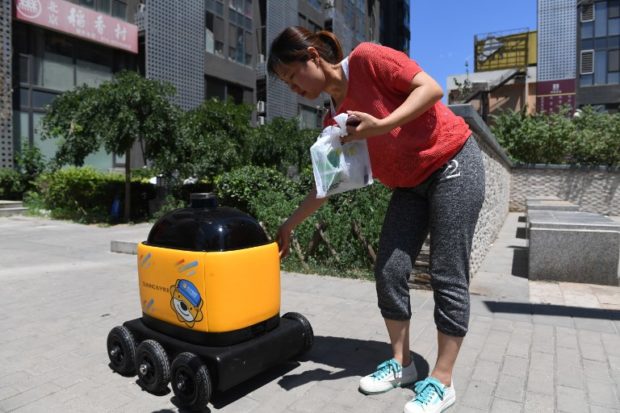In China, yellow robots deliver snacks to your home

A woman picks up groceries delivered by a Zhen Robotics delivery robot at a residential compound during a demonstration of the robot in Beijing. / AFP PHOTO / GREG BAKER
BEIJING, China – Along a quiet residential street on the outer edges of Beijing, a yellow and black cube about the size of a small washing machine trundles leisurely to its destination.
This “little yellow horse” is an autonomous delivery robot, ferrying daily essentials like drinks, fruit and snacks from the local store to the residents of the “Kafka” compound in the Chinese capital.
Equipped with a GPS system, cameras and radar, the robots are seen by their creator as the future of logistics in China, where he says one billion packages will eventually be delivered every day.
Travelling at a less than overwhelming three kilometres (two miles) per hour — a slow human walk — the robot has room for improvement, said one customer as she removed a packet of nuts from its bowels.
“The weak point is that it cannot deliver directly to the door like a human,” said the customer, who does not live on the ground floor.
“But it’s still quite practical. The robot delivers relatively quickly,” she said.
The robot takes advantage of Chinese consumers’ love of cashless payments and smartphone shopping.
China is the world’s biggest online shopping market with more than half of its population making at least one smartphone purchase per month, according to professional services firm PricewaterhouseCoopers. This compares to 14 percent in the rest of the world.
Whether buying electronics or toilet paper, avocados or clothes, Chinese are used to simply tapping a button on their smartphone and getting a home delivery — sometimes several per day.
To get a delivery via the “little yellow horse,” the customer selects the desired products, taps in the address and pays via their phone.
The supermarket staff place the items in the robot, and the robot bustles off.
One billion packages
Liu Zhiyong, founder and CEO of Zhen Robotics, which manufactures the robot, sees a bright future for his yellow creation.
“At the moment, there are 100 million packages delivered every day in China. It will be one billion in the future,” Liu told AFP.
“There will not be enough humans to make the deliveries. We need more and more robots to fill this gap in manpower. And to reduce costs,” added the CEO.
These costs are especially high in the last kilometre of a delivery, where precision is key and a customised service is required to get the product to the front door.
At the moment, the yellow robots in the Kafka compound have little to trouble them, moving along a wide pavement with no obstacles — and no cars.
Weighing 30 kilograms (around 65 pounds) and with a theoretical top speed of 12 kilometres per hour on their six wheels, the robots have four cameras constantly scanning the world around them and a laser tele-detection system allowing them to avoid obstacles.
Liu’s firm has already signed up Suning, a large electronics firm that also runs a network of small supermarkets.
But not everyone is convinced the robots are a long-term logistics solution.
Shao Zhonglin, former deputy secretary-general of the China Express Association, noted they were useful “over a short range.”
“It’s not certain however that they can be a broad solution for the final kilometre of delivery. Because the client still has to come down to get his package,” added Shao.
“Plus the costs remain quite high: buying and maintaining the robots, operating costs, etc.”
‘Not resellable’
But Zhen Robotics is convinced the costs will come down over time.
CEO Liu also says the robot will soon be equipped with the necessary technology to operate a lift, meaning it will no longer be confined to ground-floor deliveries.
In the meantime, deliveries in China are increasingly being made by autonomous means. In recent months, several firms have received the green light to operate drones, either to deliver directly to the customer or to ferry goods between hubs.
And Liu has a warning for anyone trying to vandalise or steal the yellow robot.
“With GPS, we are constantly tracking them, cameras are filming and it can sound an alarm,” he said.
“Anyway, what would a thief do with it? It’s not exactly resellable.”